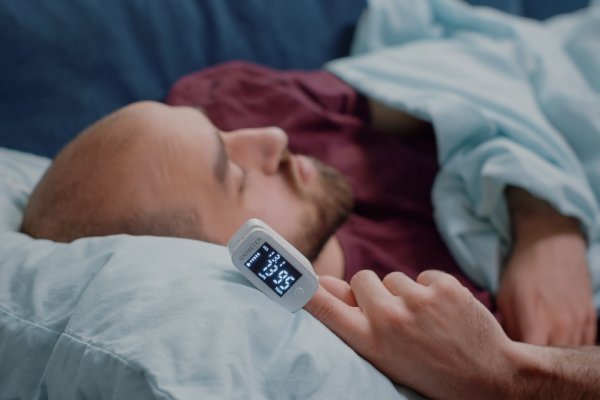
Have you ever found yourself excessively snoring? Isn’t it exhausting and frustrating? It gives a signal for a serious health condition like sleep apnea. In this condition, you wake up feeling exhausted despite a whole night’s sleep. One of the most troubling effects of sleep apnea is its impact on your heart rate. You might be wondering how sleep apnea affects your heart rate and what that means for your overall health. However, in this blog, we’ll explore sleep apnea and heart rate and how this condition can cause serious health issues.
What is Sleep Apnea?
Sleep apnea is a sleep disorder in which breathing repeatedly stops and starts while you sleep. This happens when the muscles in the back of your throat relax excessively, blocking your airway. As a result, your body is temporarily deprived of oxygen, leading to frequent awakenings throughout the night. However, it’s essential to know two primary types of sleep apnea: obstructive sleep apnea (OSA) and central sleep apnea. While OSA is a more common form, it occurs when the throat muscles relax too much, obstructing airflow. On the other hand, central sleep apnea happens when the brain fails to send the correct signals to breathing muscles.
The Connection Between Sleep Apnea and Heart Rate
According to the American Sleep Apnea Association, around 22 million Americans suffer from sleep apnea, with moderate and severe cases. This means that a large portion of people who experience disruptions in their heart rate due to sleep apnea may be unaware. So, how does sleep apnea affect heart rate? When your breathing pauses during the night, your body becomes stressed. When your airway closes, oxygen levels drop, triggering your body’s fight-or-flight response.
As a result, your heart rate increases to compensate for the lack of oxygen. This repeated increase in heart rate during sleep can affect your cardiovascular health over time. Furthermore, sleep apnea heart rate fluctuations can occur several times at night. These variations can cause your heart to work harder. Further leading to high blood pressure, irregular heart rhythms, and even the development of heart disease in the long run.
How Does Sleep Apnea Affect the Heart?
When you stop breathing during a sleep apnea episode, your oxygen levels drop drastically. The body reacts to this lack of oxygen by releasing stress hormones like adrenaline. This causes your heart rate to spike, a condition known as tachycardia. As your heart pumps faster to increase blood flow, this rapid heart rate can happen multiple times at night. However, it has been found in studies that people with sleep apnea are 2 to 3 times more likely to develop cardiovascular problems. These problems may include high blood pressure and heart disease. Which is attributed to the repeated heart rate surges caused by apneas at night.
Struggling with Sleep Apnea?
Discover a convenient and effective way to manage your sleep apnea without leaving your home.
Impact of Frequent Heart Rate Fluctuations
Every time your heart rate spikes due to a sleep apnea episode, it strains your cardiovascular system. If sleep apnea is left untreated, the increased heart rate during sleep can lead to arrhythmias (irregular heartbeats). This not only disrupts your sleep but also increases the risk of heart-related complications such as heart failure, stroke, and hypertension.
A study published showed that 25-50% of people with untreated sleep apnea experience some form of arrhythmia, with atrial fibrillation being the most common. This condition can cause significant disruptions in heart rhythm and lead to an increased risk of stroke.
The continuous stress on your cardiovascular system weakens your heart muscle over time.
Short-Term and Long-Term Effects on the Heart
The connection between sleep apnea and heart rate doesn’t just affect your heart during the night; it can have long-lasting consequences on your overall health.
Short-Term Effects
In the short term, the repeated spikes in heart rate caused by sleep apnea heart rate fluctuations can make you feel fatigued and unrested. This is because your body never truly reaches the restorative deep stages of sleep, which affects your overall well-being. As a result, you may experience daytime drowsiness, difficulty concentrating, and irritability. Thus, people with untreated sleep apnea have a 30-50% higher risk of suffering from daytime sleepiness and decreased cognitive function due to poor-quality sleep.
Long-Term Effects
Over time, the repeated strain on your heart and the body’s increased fight-or-flight response can lead to chronic conditions. Such as high blood pressure (hypertension) and an increased risk of heart disease. Furthermore, untreated sleep apnea has been linked to atrial fibrillation, a type of irregular heartbeat that can lead to stroke and other severe cardiovascular issues. Moreover, some studies reveal that hypertension is present in 50-75% of patients with sleep apnea, highlighting the deep connection between sleep apnea and heart rate.
Why It’s Important to Treat Sleep Apnea
Now that we understand how sleep apnea affects heart rate, it’s clear why early diagnosis and treatment are essential. Sleep apnea and heart rate fluctuations should not be ignored, as untreated sleep apnea can significantly impact your cardiovascular health.
1. Treating Sleep Apnea to Protect Your Heart
Treating sleep apnea can prevent repeated fluctuations in heart rate and help keep your heart healthy. Continuous Positive Airway Pressure (CPAP) therapy is the most common treatment for obstructive sleep apnea. A CPAP machine helps keep your airway open by delivering constant airflow worn while you sleep. Furthermore, the CPAP treatment has significantly reduced blood pressure and heart rate variability in patients. This condition also offers relief from the cardiovascular strain caused by the condition. Some home sleep study emphasized that early treatment reduces the risk of heart-related complications such as hypertension and arrhythmias.
2. Lifestyle Changes to Manage Sleep Apnea
In addition to medical treatments, making specific lifestyle changes for example exercises for sleep apnea and many other ways that can significantly reduce the impact of sleep apnea on your heart rate. Some of these changes include:
- Losing weight: Excess weight, especially around the neck area, can contribute to airway obstruction during sleep.
- Avoiding alcohol and sedatives: These substances relax the muscles of the throat, making sleep problems worse.
- Sleeping on your side: This position can prevent airway collapse, which is more common when sleeping on your back.
Protect Your Heart by Addressing Sleep Apnea
If you’ve been dealing with constant fatigue, snoring, or other sleep apnea symptoms, it’s time to pay attention to how sleep apnea affects your heart rate. The fluctuating heart rate caused by sleep apnea can put unnecessary strain on your cardiovascular system and increase the risk of heart disease over time. However, with the right treatments and lifestyle changes, you can protect your heart and improve your quality of life. Treating sleep apnea helps you get better and deep sleep and ensures that your heart stays strong and healthy for years. If you suspect sleep apnea, consult a healthcare professional and explore your treatment options to safeguard your health.
Ready to Take Control of Your Sleep?
Book your appointment today and start your journey toward better sleep health.

